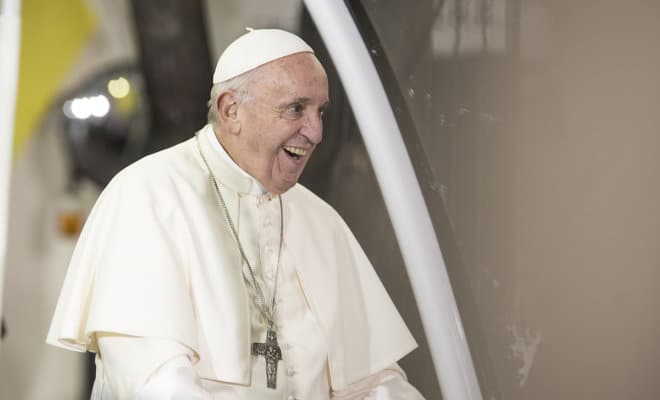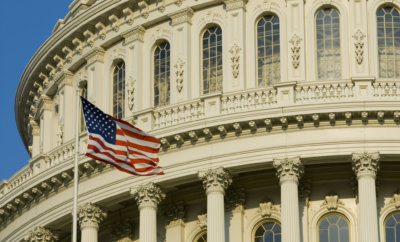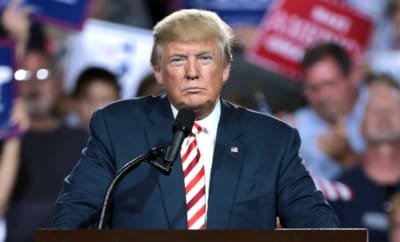Immigration
Separation of Migrant Families Draws International Outrage, Criticism From Pope

Pope Francis smiles at supporters outside the Vatican Apostolic Nunciature in Santiago, Chile, on Jan. 15, 2018.
Photo: Bloomberg photo by Tamara Merino
Responding to outrage within the United States and abroad, Trump signed an executive order that would keep families together in federal custody while awaiting prosecution for illegal border crossings.
President Donald Trump’s immigration policies drew international condemnation Wednesday from allies and religious leaders, including Pope Francis, who took aim on moral grounds at the administration’s practice of separating migrant children from their parents at the U.S.-Mexico border.
Responding to outrage within the United States and abroad, Trump on Wednesday signed an executive order that would keep families together in federal custody while awaiting prosecution for illegal border crossings – though that could run afoul of a 1997 court settlement limiting the duration of child detentions.
The pressure Trump faced as he signed the order resembled the global reaction last year to his travel ban targeting several Muslim-majority countries. But in this case, the criticism came in part from leaders who have contended with border security issues of their own – and who say Trump overstepped an important line.
Leaders from London to Ottawa to Tehran described the separations as unjust and cruel. In pointed comments before lawmakers in Parliament, British Prime Minister Theresa May described photos she had seen of children “being held in what appear to be cages.”
“This is wrong,” she said. “This is not something we agree with.”
The pope, who has placed the issues facing migrants at the center of his papacy, also stepped into the issue, saying in an interview with the Reuters news agency that he agreed with statements by U.S. Catholic bishops, who called the separations “immoral” and “contrary to our Catholic values.” He added that “populism” and “creating psychosis” are not the way to resolve migration problems.
“It’s not easy, but populism is not the solution,” the pope said in the interview.
The separation practice began last month as part of the administration’s effort to criminally prosecute all adults caught crossing the border without authorization – a “zero-tolerance policy” designed to discourage illegal immigration, appeal to Trump’s base and extract congressional funding for his promised border wall. Immigrant parents have been held in criminal detention; their children have been released to shelters, relatives or other sponsors.
On Tuesday, the Department of Homeland Security said 2,342 children had been separated from their parents between May 5 and June 9.
The bulk of the separated children have come from Guatemala, Honduras and El Salvador, officials say.
One of El Salvador’s top diplomats, Deputy Foreign Minister Liduvina Magarin, on Wednesday described conditions at shelters for migrant children in the United States as “totally inadequate” and blasted the Trump administration for “sacrificing the youngest, who are not the ones who make the decision to migrate.” She warned that migrants should seriously consider any decision to travel north.
Guatemalan President Jimmy Morales said earlier this week that he “respected” Trump’s policy. On Tuesday, Guatemala changed course and joined other countries in rejecting family separation.
Canadian Prime Minister Justin Trudeau on Wednesday called the U.S. separation policy “unacceptable” and “wrong.” But his government also said it is not planning to allow migrants to pass through the United States and instead claim asylum in Canada.
Ayatollah Ali Khamenei, who wields ultimate religious and political authority in Iran and often weighs in when there is a chance to highlight U.S. moral failures, said Wednesday that the policy was “a big concern.” “One cannot watch with a sound state of mind these children crying on TV,” read a tweet from Khamenei’s English-language Twitter account.
The policy even drew fire from one of Europe’s most prominent anti-immigrant leaders, France’s Marine Le Pen. “I am opposed to a procedure that separates parents and children,” she told France 2 television. She added: “Those who are responsible are the immigrant parents and the politicians who encourage them to come.”
In Britain, a Labour Party lawmaker, Gavin Shuker, noted that Trump is scheduled to visit next month and asked what it would take for May to rescind the invitation. “President Trump has locked up 2,000 little children in cages and is refusing to release them unless he’s allowed to build a wall. He’s quit the U.N. Human Rights Council, praised [North Korean leader] Kim Jong Un’s treatment of his own people, turned away Muslims. What does this man have to do to have the invitation . . . revoked?”
May replied that the visit would go ahead but that “when we disagree with the United States, we tell them so.”
In the interview Sunday night, the pope also took aim at Italy’s new populist government, which has been cracking down on asylum seekers attempting dangerous crossings by boat from Africa.
“I believe that you cannot reject people who arrive,” Francis said, according to Reuters. “You have to receive them, help them, look after them, accompany them and then see where to put them, but throughout all of Europe.”
He added: “Some governments are working on it, and people have to be settled in the best possible way, but creating psychosis is not the cure. Populism does not resolve things. What resolves things is acceptance, study, prudence.”
He also warned that aging societies in Europe face “a great demographic winter” without more immigrants. He predicted that Europe “will become empty” if immigration is cut off.
Michael Czerny, the Vatican’s undersecretary for migrants and refugees, said in an interview that the pope’s stance on the separation of children and their families came from “basic humanity and sheer common sense.” Czerny added: “I don’t think you have to dig deep into religious tradition – though I can’t imagine any religious tradition that would condone this. It’s not a question of dogma. It a question of humanity.”
Branigin reported from Washington. The Washington Post’s Karla Adam in London, Erin Cunningham in Istanbul, Michael Birnbaum in Brussels and Anna-Catherine Brigida in San Salvador contributed to this report.
(c) 2018, The Washington Post




You must be logged in to post a comment Login